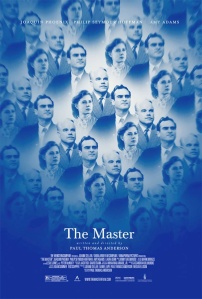By: Addison Wylie
The power of suggestion is afoot in The Master. Not just in the film itself, but it surrounded the film’s promotion and lead-up to its theatrical release.
With the mention of a cult and a leader confidently guiding followers through his “rational thinking and cleansing”, many linked Paul Thomas Anderson’s latest to Scientology and to L. Ron Hubbard, the creator of the infamous religion. It struck controversy around the film and the suggestion of it piqued a lot of interest. Especially since PTA directed Tom Cruise, a devoted Scientologist, in the 1999 flick Magnolia.
Those going into The Master wanting a sharp send-up to the much talked about religion and its followers have another thing coming – because the film isn’t interested in satire.
Through his career, PTA has never been a satirist but rather a filmmaker who is inspired and takes those ideas and formulates them into something of his own.
Take Boogie Nights. Porn Star John Holmes was a “big” inspiration crafting Mark Wahlberg’s Dirk Digger.
Adam Sandler’s motif to buy oodles and oodles of pudding in order to garner an extreme amount of frequent flyer miles in Punch-Drunk Love was inspired by David Phillips’ encounter with a faulty Healthy Choice Foods promotion in 1999.
PTA isn’t parodying L. Ron Hubbard but rather ideas of the Scientologist have inspired the filmmaker. Hubbard was a man who was dedicated to his craft and practices and knew how to confidently fulfill people with hope and ideas – even if his ways didn’t sit well with others.
What movie goers will get when they watch The Master is an absolutely fascinating character struggle between two different hard-wired minds in an ultimate case of “keep your friends close and your enemies closer.”
Joaquin Phoenix plays Freddie Quell, a disturbed individual returning from World War II and trying to figure out where he fits in. The only noteworthy characteristics he has are that he’s a talented photographer and has a keen taste for alcohol. He, unfortunately, lets the latter take control of him which causes him to spiral out of control and cause public chaos.
He soon meets Lancaster Dodd (played by Philip Seymour Hoffman) on a boat after he sneaks on it, using it as a way to figure out his next destination. Dodd likes the cut of Freddie’s jib after he tastes the alcoholic mixture Freddie has conjured up.
The friendship the two begin is an odd one. Freddie sees Lancaster’s profession and his large following as something he could latch onto in order to help him find a proper existence. Lancaster sees Freddie as another follower – an ill-tempered one at that – but knows that Freddie – although a drunk – is sharp.
With Freddie’s desperation and Lancaster’s ability to be compassionate, confident, and controlling, the two go hand-in-hand. It’s suggested to Freddie that he’s found a good place to be and in good company.
There are doubters to Dodd’s theories and Freddie makes sure they’re taken care of in order to keep his place at the Dodd residence. Throughout The Master, it’s suggested that Freddie may be starting to see the seams in Dodd’s thinking. However, these violent outbursts and the silencing of those who are skeptical keep that innocence alive and the fear of being a drifter once again diminished.
We also feel for Hoffman’s Dodd as he strains to keep the continuity straight amongst his theories. He constantly has to please his people and we feel that stress build and build.
Phoenix and Hoffman are outstanding in roles that require them to do a lot of heavy lifting. With subtle changes to character always in effect and a smart script that has the two quietly going head-to-head with each other, the two actors have succeeded marvellously.
It’s fair to say the film is disjointed – it does have that feeling. For instance, when Dodd has a run-in with the law, it seems like it’s an issue that is taken care of fast. However, The Master has a script that is fixated on driving the film forward, even if that means not giving every single event that happens in the film a lot of time to be focused on.
Surprisingly, it works here. Anderson has a clear vision as to where to take his characters and how to tell the story. If something’s been seemingly glossed over, it’s because not much more detail is required without making it feel needlessly extended. Or, it’s been wisely left open for interpretation. Anderson realizes he has a talky drama on his hands and is interested in progression instead of pulling his film over.
On the technical front, the film looks and sounds fantastic. Mihai Malaimare Jr. has demonstrated that cinematography is an art form, especially with those old-thyme photo shoots. Jonny Greenwood’s score fits the film like a glove; it’s subtle but adds a magically disorienting nuance.
The Master is very character driven and dialogue heavy, which again, may drive away those movie goers expecting something else. If you think you have the patience for a drama such as this one, you’ll be happily rewarded in the end. This is a meticulously crafted film that is strong in every aspect. Surely one of the year’s best.



One of the widest reactions to a film I’ve seen all year from the blogging community, it seems you’re on the slightly more popular side of really enjoying it but I’ve talked to a lot of people who have absolutely hated it. I’m sad to say I haven’t caught it yet but I’m looking forward its DVD release. Good review 🙂